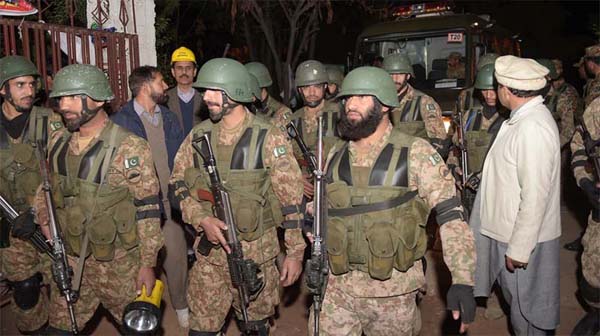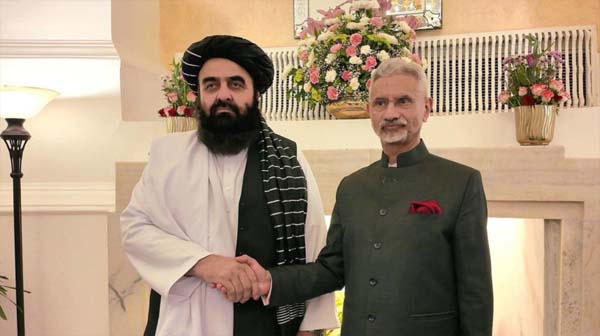Wednesday, 25 February 2026, 04:39 AM
October 12, 2025
 Intense clashes have broken out between Pakistani and Afghan troops along the border region. The fighting reportedly began on Saturday night (October 11) between Pakistani soldiers and Afghan border guards.
Local authorities in Afghanistan’s southern Helmand province stated that Taliban fighters have taken control of two Pakistani border posts.
Pakistani security officials confirmed that fighting occurred in more than five locations along the border and that retaliatory attacks are underway.
The latest confrontation follows an airstrike in Kabul on Friday night, reportedly targeting a top leader of the militant group Tehrik-i-Taliban Pakistan (TTP). The Taliban government in Kabul blamed Islamabad for the airstrike, sharply escalating tensions between the two neighboring countries....
Intense clashes have broken out between Pakistani and Afghan troops along the border region. The fighting reportedly began on Saturday night (October 11) between Pakistani soldiers and Afghan border guards.
Local authorities in Afghanistan’s southern Helmand province stated that Taliban fighters have taken control of two Pakistani border posts.
Pakistani security officials confirmed that fighting occurred in more than five locations along the border and that retaliatory attacks are underway.
The latest confrontation follows an airstrike in Kabul on Friday night, reportedly targeting a top leader of the militant group Tehrik-i-Taliban Pakistan (TTP). The Taliban government in Kabul blamed Islamabad for the airstrike, sharply escalating tensions between the two neighboring countries....
October 11, 2025
 Afghanistan's Foreign Minister Amir Khan Muttaqi today said his country would depute its diplomats to India as part of step-by-step efforts to improve bilateral relations.
Muttaqi made the announcement at a media briefing hours after holding extensive talks with Indian External Affairs Minister S Jaishankar, who told him that New Delhi would reopen its embassy in Kabul.
The Afghan diplomatic missions in India have officials who were largely appointed by the previous Ashraf Ghani government.
India has not yet recognised the Taliban set-up and has been pitching for the formation of a truly inclusive government in Kabul.
On India's stance regarding recognition of the Taliban-led government, Muttaqi said, "This is my first visit to India, and today we have decided that India will upgrade its technical mission to an embassy and we will also send our diplomats here. India-Afghanistan relations are historic, and our diplomatic engagement is moving forward positively."...
Afghanistan's Foreign Minister Amir Khan Muttaqi today said his country would depute its diplomats to India as part of step-by-step efforts to improve bilateral relations.
Muttaqi made the announcement at a media briefing hours after holding extensive talks with Indian External Affairs Minister S Jaishankar, who told him that New Delhi would reopen its embassy in Kabul.
The Afghan diplomatic missions in India have officials who were largely appointed by the previous Ashraf Ghani government.
India has not yet recognised the Taliban set-up and has been pitching for the formation of a truly inclusive government in Kabul.
On India's stance regarding recognition of the Taliban-led government, Muttaqi said, "This is my first visit to India, and today we have decided that India will upgrade its technical mission to an embassy and we will also send our diplomats here. India-Afghanistan relations are historic, and our diplomatic engagement is moving forward positively."...
November 29, 2019
 China vented Thursday after President Donald Trump signed new human rights legislation covering the protest-wracked city of Hong Kong. It denounced the new law as illegal interference in its own affairs. It summoned the US ambassador for the second time in a week. It vowed retaliation.
The threats sounded severe. They also sounded empty.
Behind the harsh rhetoric, China has few options for striking back at the United States in a meaningful way. And it has bigger priorities — namely, ending the increasingly punishing trade war between the two countries. Though both sides are talking about their willingness to reach a deal, they have yet to sign even an interim pact that would head off potentially damaging new tariffs less than three weeks from now.
On Thursday, Beijing’s main agency on trade remained quiet on the legislation even as other officials railed against it, suggesting that the government remained open to a trade deal and would let the volatile issue of Hong Kong simmer, at least for now.
“Beijing will make a lot of noises but they can’t afford to do much,” said Steve Tsang, director of the SOAS China Institute in London, a research Centre. “The trade deal is so important to the Chinese that they won’t let anything upset it.”
On the face of it, Trump’s signature on two bills looks like a direct brushback against Beijing’s rule over Hong Kong. The former British colony operates under its own laws but has come increasingly under the sway of Beijing, one reason behind the increasingly violent protests that have troubled the Chinese territory for five months.
The first bill authorises the US government to impose sanctions on Chinese or Hong Kong officials responsible for human rights abuses there. The second bill bans the sale of American-made tear gas, rubber bullets or other crowd-control equipment to Hong Kong authorities.
China’s reaction was immediate but unspecific. It summoned Terry Branstad,...
China vented Thursday after President Donald Trump signed new human rights legislation covering the protest-wracked city of Hong Kong. It denounced the new law as illegal interference in its own affairs. It summoned the US ambassador for the second time in a week. It vowed retaliation.
The threats sounded severe. They also sounded empty.
Behind the harsh rhetoric, China has few options for striking back at the United States in a meaningful way. And it has bigger priorities — namely, ending the increasingly punishing trade war between the two countries. Though both sides are talking about their willingness to reach a deal, they have yet to sign even an interim pact that would head off potentially damaging new tariffs less than three weeks from now.
On Thursday, Beijing’s main agency on trade remained quiet on the legislation even as other officials railed against it, suggesting that the government remained open to a trade deal and would let the volatile issue of Hong Kong simmer, at least for now.
“Beijing will make a lot of noises but they can’t afford to do much,” said Steve Tsang, director of the SOAS China Institute in London, a research Centre. “The trade deal is so important to the Chinese that they won’t let anything upset it.”
On the face of it, Trump’s signature on two bills looks like a direct brushback against Beijing’s rule over Hong Kong. The former British colony operates under its own laws but has come increasingly under the sway of Beijing, one reason behind the increasingly violent protests that have troubled the Chinese territory for five months.
The first bill authorises the US government to impose sanctions on Chinese or Hong Kong officials responsible for human rights abuses there. The second bill bans the sale of American-made tear gas, rubber bullets or other crowd-control equipment to Hong Kong authorities.
China’s reaction was immediate but unspecific. It summoned Terry Branstad,...
November 26, 2019
 Myanmar is in breach of a global convention banning chemical weapons and may have a stockpile left over from the 1980s, the United States said on Monday.
The southeast Asian nation may still have weapons at a "historic" facility where mustard gas was produced, a senior State Department official told the annual meeting of the Organisation for the Prohibition of Chemical Weapons.
Myanmar officially joined the Chemical Weapons Convention (CWC), which bans the production, storage and use of chemical arms, in 2015.
"The US has serious concerns that a chemical weapons stockpile may remain at Myanmar's historical chemical weapons facility," Thomas DiNanno, Deputy Assistant Secretary of State, told the OPCW in The Hague.
Washington had information that Myanmar "had a chemical weapons programme in the 1980s that included a sulphur mustard development programme and chemical weapons production facility", he added.
"Based on available information, the United States certifies that Myanmar is in non-compliance with the CWC, due to its failure to declare its past chemical weapons programme and to destroy its chemical weapons facility."
Myanmar has previously faced accusations of storing and using such weapons.
In 2013, a parliamentary report said police had used phosphorus the previous year against protesters at a copper mine in the north of the country, causing severe burns.
In July 2014, five journalists from Myanmar were sentenced to 10 years in prison with hard labour over an article accusing the military of producing chemical arms.
The previous year, Myanmar's then quasi-civilian government denied using chemical weapons against rebels from the Kachin ethnic minority during clashes in the north of the country.
The US official said Washington had held talks with Myanmar's civilian government and military over the issue and "stands ready to assist Myanmar" to destroy the weapons.
Myanmar was the 191st...
Myanmar is in breach of a global convention banning chemical weapons and may have a stockpile left over from the 1980s, the United States said on Monday.
The southeast Asian nation may still have weapons at a "historic" facility where mustard gas was produced, a senior State Department official told the annual meeting of the Organisation for the Prohibition of Chemical Weapons.
Myanmar officially joined the Chemical Weapons Convention (CWC), which bans the production, storage and use of chemical arms, in 2015.
"The US has serious concerns that a chemical weapons stockpile may remain at Myanmar's historical chemical weapons facility," Thomas DiNanno, Deputy Assistant Secretary of State, told the OPCW in The Hague.
Washington had information that Myanmar "had a chemical weapons programme in the 1980s that included a sulphur mustard development programme and chemical weapons production facility", he added.
"Based on available information, the United States certifies that Myanmar is in non-compliance with the CWC, due to its failure to declare its past chemical weapons programme and to destroy its chemical weapons facility."
Myanmar has previously faced accusations of storing and using such weapons.
In 2013, a parliamentary report said police had used phosphorus the previous year against protesters at a copper mine in the north of the country, causing severe burns.
In July 2014, five journalists from Myanmar were sentenced to 10 years in prison with hard labour over an article accusing the military of producing chemical arms.
The previous year, Myanmar's then quasi-civilian government denied using chemical weapons against rebels from the Kachin ethnic minority during clashes in the north of the country.
The US official said Washington had held talks with Myanmar's civilian government and military over the issue and "stands ready to assist Myanmar" to destroy the weapons.
Myanmar was the 191st...